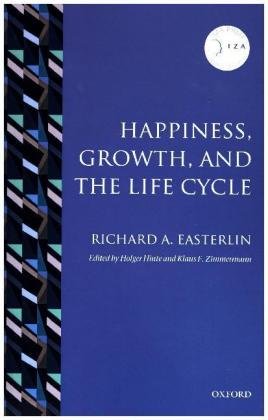
Happiness, Growth, and the Life Cycle
| Verlag | Oxford University Press |
| Auflage | 2016 |
| Seiten | 300 |
| Format | 13,9 x 21,6 x 1,4 cm |
| Print PDF | |
| Gewicht | 383 g |
| Artikeltyp | Englisches Buch |
| Reihe | IZA PRIZE IN LABOR ECONOMICS SERIES IZA PAPER |
| ISBN-10 | 0198779984 |
| EAN | 9780198779988 |
| Bestell-Nr | 19877998EA |
The second in a series of books published with the IZA and honoring the work of its annual prize winners in labour economics. It presents Richard Easterlin's outstanding research on the analysis of subjective well-being, and on the relationship between demographic developments and economic outcomes.
Published with the IZA, this volume presents Richard Easterlin's outstanding research on the analysis of subjective well-being, and on the relationship between demographic developments and economic outcomes. In both fields, his work has laid the foundations for enlarging the scope of traditional economic analysis and has increased our understanding of behaviour in several important domains, such as fertility choices, labour market behaviour, and the determinants of individual well-being.
In various seminal contributions, Easterlin has demonstrated the importance of material aspirations and relative economic status for human behaviour. This book is a collection of 11 of his key papers, revised and edited to make a cohesive book. New material includes an Introduction from the editors, two section Introductions from Easterlin, and an Epilogue from Easterlin.
Inhaltsverzeichnis:
I. Introduction by the Editors: Shaping the Economics of Happiness- The Fundamental Contributions of Richard Easterlin
II. Growth and Happiness
Introduction
1: Does Economic Growth Improve the Human Lot? Some Empirical Evidence
2: Will Raising the Incomes of All Increase the Happiness of All?
3: Happiness and Economic Growth: Does the Cross-Section Predict Time Trends? Evidence from Developing Countries
4: Lost in Transition: Life Satisfaction on the Road to Capitalism
5: Happiness and Growth the World Over: Time Series Evidence on the Happiness-Income Paradox
III. Life Cycle Happiness
Introduction
6: Income and Happiness: Towards a Unified Theory
7: Life Cycle Happiness and its Sources: Intersections of Psychology, Economics, and Demography
8: The Cross-Over in the Life Cycle Happiness of American Women and Men
9: Aspirations, Attainments, and Satisfaction: Life Cycle Differences between American Women and Men
10: Happiness and Domain Sat isfaction: New Directions for the Economics of Happiness
11: Explaining Happiness
IV. Epilogue
